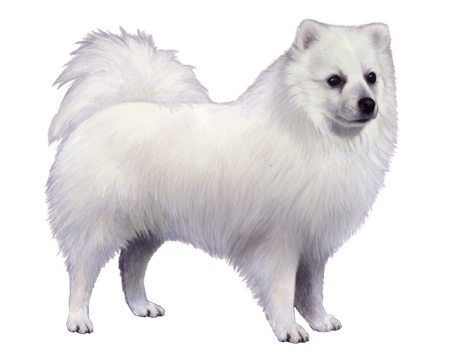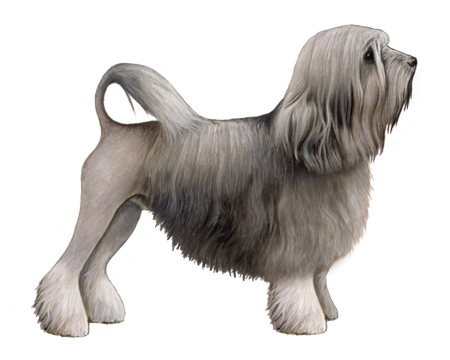
Mi-ki
The Mi-Ki is a newer breed that has earned a reputation as a gentle, affectionate family pet. These long-haired toy dogs are friendly and outgoing but have a calm, quiet nature.
Interested in discovering if your dog is a Mi-ki?
Check out Wisdom Panel's DNA tests.

Mi-ki Traits
General Appearance
The Mi-Ki is a toy breed with a fine-to-medium bone structure and light gait.
Coat and Colouring
Mi-Kis are single-coated dogs with long, silky hair that covers their entire bodies. Their hair may have a slight wave and grows to its natural length. The breed often sports a "show cut" that features, in part, a shaved head and muzzle with the hair under the ears left natural, creating a ruff around the face. A beard and mustache are optional (and adorable).
The Mi-Ki's coat comes in all colors. Popular colors include cream, red, silver, black, white, blue, apricot, brown, beige, fawn, and mahogany. Their color patterns can be solid or parti-color. Puppies often change color before reaching adulthood.
Distinctive Physical Traits
These toy breed dogs are slightly longer than tall with level toplines, firm shoulders, and fine-boned legs. Their tails are heavily plumed, and their winged or drop ears are well-fringed. Mi-Kis' large, round eyes are typically dark-colored. However, blue and ruby-colored eyes are possible with certain coat colors.
Mi-ki Temperament
Mi-Kis are adaptable and sweet-natured dogs that are friendly and playful. The breed also has some cat-like characteristics and can be independent and quiet. Though they may let out an occasional warning bark, the Mi-Ki is not yappy.
These dogs take their job as adorable companions seriously. They readily welcome people (even strangers) and pets into their lives. Mi-Kis are great family pets, and their calm and quiet demeanors make them excellent dogs for apartment living.


Mi-ki History
Wisconsin breeder Maureen van Wormer (also known as Mikki Mackin) wanted to create a small, long-haired breed with a calm, quiet temperament. She crossbred Shih Tzus with Papillion, Maltese, Yorkshire Terriers, and Japanese Chin to develop the Mi-Ki (pronounced Mee-Kee). Though the original breeding records were lost, extensive DNA analysis of 321 genetic markers found traces of Pekingese and Pomeranian, as well.
After developing the breed standard in 1991, the first Mi-Ki registry was formed in 1999 to develop the breed further.
Mi-ki Care
Nutrition
Feed Mi-Kis a high-quality dog food that's appropriate for their life stage (e.g., puppy, adult, senior). A diet created specifically for toy breed dogs is a great option to consider. Keep an eye on their food intake to prevent Mi-Kis from becoming overweight. Portion out their food with a measuring cup and limit treats to no more than 10% of their daily calories.
Grooming
Though they're a low-shedding breed, maintaining a Mi-Ki's luxurious coat requires grooming. Occasional baths (with conditioner) and regular brushing are needed to prevent mats and tangles.
In addition to regular ear cleaning and nail trims, start a dental care routine. Brushing their teeth and scheduling professional cleanings ensures good oral hygiene throughout their lives.
Exercise
Mi-Kis are a moderately active breed that requires occasional walks or playtime in a fenced yard. They may also enjoy activities such as competitive obedience or agility. Provide opportunities for mental and physical stimulation, such as games and puzzle toys, to keep these intelligent pups engaged and active.
Training
Mi-Kis are smart and eager to please—a combination that makes them easy to train. Consistent training that incorporates positive reinforcement and rewards can encourage this sweet, gentle breed to adopt positive behaviors. Engage their outgoing personalities with group sessions and games. Regular socialization is also important.

Mi-ki Genetic Health Conditions
-
Chondrodystrophy (CDDY) and Intervertebral Disc Disease (IVDD) Risk
Chondrodystrophy (CDDY) is a skeletal disorder characterized by shortened limbs and abnormal early degeneration of the spinal discs, or intervertebral disc disease (IVDD), which predisposes to disc herniation.
Knowing if your Mi-ki is a carrier or at-risk for these conditions can help you and your veterinarian plan for your pup's lifelong care. With Wisdom Panel™ Premium, you can get results for over 200 genetic health tests.
Breed Group
Companion
This group consists of dogs typically bred for the specific purpose of human companionship, and many are popular pets because of their gentle nature. They became more common as the concept and luxury of dogs as pets prevailed.
Resources
https://americanmi-kiclub.com/the-mi-ki/mi-ki-breed-history/
Reviewed 26 July 2020 by Annette Louviere, DVM



























_Color.png)










